On April 16-20, 2012 the 21st International World Wide Web Conference (#WWW2012) gathered around 2,500 internet and social science professionals, web and mobile technology creators, researchers and scholars, in Lyon, France to discuss matters of global concern for the Internet and the Web. The main themes were “Society and Knowledge” and “The Future Direction of the Web”.
The conference agenda covered both social and technological issues, as well as Internet and democracy, free access to services, freedom of expression, regulation and censorship, control and copyright. The #WWW2012 proceedings are available online, so the many interesting papers can be downloaded. Plenary keynotes videos are also available.
I was a program committee member for a Making Sense of Microposts (#MSM12) workshop. I also presented a research paper on “phatic communication” and why tweets and Facebook updates on weather, food, and mundane life are useful for online communities, human relationships and social networks (I have written about this subject here, here, and here).
“Imagine what you want the world to look like”
But perhaps the major highlight of #WWW2012 was an inspiring keynote on April 18 by Tim Berners-Lee (TBL), the inventor of the World Wide Web and Director of the World Wide Web Consortium (W3C). He shared insights on the current situation of the web, as well as future directions that could threaten the vitality of the Internet. Rallying the crowd, he said, “Democracy depends on an open internet. Go out in the streets and complain that your democracy is being threatened. (It’s) a duty, something you have to do.”
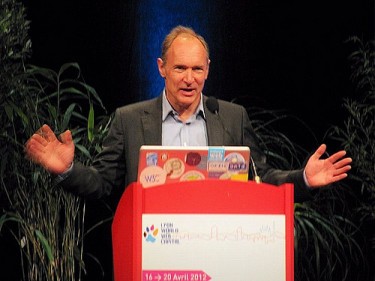
Tim Berners-Lee gives keynote speech at WWW2012: Photo by Danica Radovanovic
TBL touched on the most pressing issues of open data, open government, privacy and control, Net Neutrality, and future generations. As daily blog Demain le Mail (in French) reported:
Le fondateur du web a réalisé un plaidoyer en faveur d’un Internet libre et ouvert. Lors de sa keynote, il a exprimé ses inquiétudes concernant la collecte et l’exploitation des données personnelles. Pour Tim Berners-Lee, la menace vient de principalement de l’industrie et les utilisateurs du web doivent agir et ne pas hésiter à réclamer leurs données personnelles à Facebook ou Google par exemple ».
TBL insists, as Australian Dejanseo reports, on democratic platforms online, decentralized and open data, as well as the importance of:
the principle of least effort when designing new languages, encouraging the usage of open mobile applications if they don’t like the world of closed systems. He also stressed as in the panel the importance of the openness – open data, suggesting that the UK government needs to understand what open standards are, and urged the same for governments in any country to embrace the movement of open data. Data should be open for public: government statistics, economic, social, demographic, non-sensitive related to democracy and political debate.
Speaking about the openness and the applications accessible to all, TBL points the finger at Apple, without naming it. E. Delsol writes about it:
Face aux apps d'Apple, de Google et des autres, le W3C milite pour le développement des web apps – open mobile web apps -, ces applications créées avec html5 et accessibles depuis n'importe quel navigateur, sur n'importe quel système. Tout internaute peut accéder à l'ensemble des applications disponibles en ligne. Il enjoint les développeurs dans la salle : “La solution est entre vos mains : développez des web apps, pas des apps !”
A comment [fr] by “Open Africa” on an 01.Net article agrees with TBL's statements and reflects on the efforts for remaining the openness in Africa as well:
Je souhaite souvent que le web reste ouvert à la créativité des utilisateurs de tout lieu y compris ceux d'Afrique.Je tiens à féliciter TBL pour ces mises au point claires et virulentes.Nous travaillons beaucoup aussi ici en Afrique de l'Ouest pour avoir une meilleure visibilté sur le net tout en espérant profiter pleinement du réseau pour créer,partager, briller et donner le meilleur de nos talents.
TBL also voiced his opposition to the treaties that advocate increased surveillance and regulation of the Internet, including ACTA.
Some think, including Des Illusion blog, that TBL binds the future of the web and democracy to tightly:
Si nos libertés sur le Web sont certes menacées ou malmenées par des politiques gouvernementales répressives (SOPA, PIPA, Hadopi) pressées par des lobbies industriels et économiques ; il ne faut pas oublier que le Web n’est qu’un des supports de communication existant dans l’espace public démocratique, et non l’unique. Le web est une technologie et non un droit, ni une liberté, même si il devient le moyen d’échange prépondérant d’idées entre individus par une infinité d’outils : blogs, mails, chat, réseaux sociaux… Dans les pays arabo-musulmans, le web a joué le rôle d’un facilitateur par ses outils, permettant une mobilisation rapide et massive des protestataires au Caire, à Tunis ou à Tripoli ; mais il n’a jamais fait la révolution. Une révolution ne se fait pas avec des machines, mais avec les hommes qui sont derrière.
As someone strictly opposed to bills that advocate increased surveillance of the Internet, threaten basic freedoms on privacy, expression and the access to information, TBL asked the audience to:
…spend 90% of our time doing cool stuff, invent new things […], but the remaining 10% go to protect the open Web infrastructure on which all this is built. Because otherwise we cannot innovate, because the platforms will be closed, because service providers will control traffic.
Obviously we all need to reflect individually on these present critical issues in our society and embrace collectively actions that will foster the growth, stability, and healthy, open and neutral eco system of the Internet. Since democracy depends on the open internet – so the human discourse depends on the open internet as well, with the massive engagement where everyone gets involved.

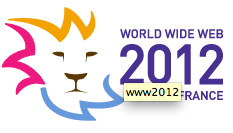
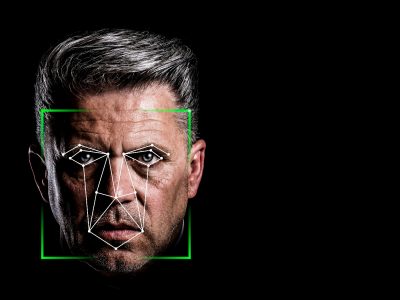
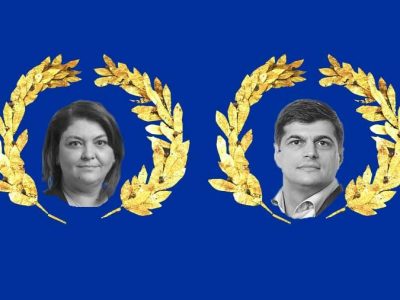
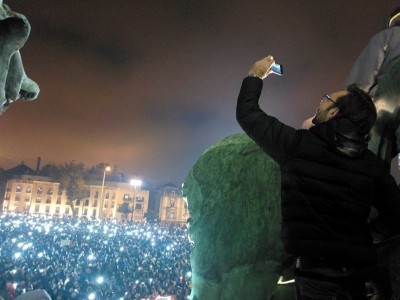
6 comments
i enjoy reading it ver informative post
What do SEO companies offer that I can’t do on my own? A
good seo company knows better how to get a site ranking high
on search engines like Google, because they have put a lot
of effort into learning all the basics of SEO, and have leaned
through trial and error what works and what doesn’t work for
their clients. Sometimes all the book knowledge in the world only
has limited use in real world applications. Experience can be the
best teacher when it comes to SEO. Because of this they will know
all the things that must be done to get your site to the top.